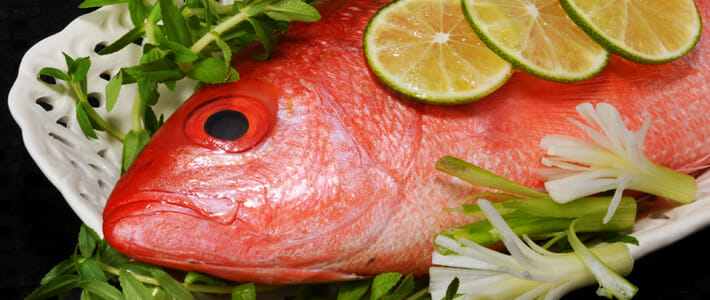Snapper, American Red

The American red snapper is also known as red snapper or genuine red snapper. The red snapper is one of the most sought-after fish in the Gulf of Mexico, prized by both commercial and recreational fishermen. Red snapper makes excellent table fare and is featured in many fine restaurants. Red snapper are an overall rosy-red color. The color fades slightly below. Key characteristics are their red eye, the anal fin being pointed rather than rounded, and the lack of a black spot on each side in individuals over 10 inches long. Many fish that are red are passed off as red snapper in the marketplace, but the only species that can be legally labeled red snapper is the American red snapper.
Product pdf for download-
4 oz. raw edible portion
-
Calories 180
-
Total Fat 3g
-
Saturated Fat 1g
-
Cholesterol 67mg
-
Sodium 115mg
-
Carbohydrates 0g
-
Protein 36g
Interesting Fact
Red snapper spawns over 20 times a year at 4 to 6 day intervals between late May and early October, with a peak in June-August. Some red snapper mature at less than one foot in length, and they continue to spawn for the rest of their lives. Small fish will produce less than 500 eggs per spawn and large fish over 2 million eggs. Red snapper spawn in early evening. Their eggs and larvae are free-floating and at the mercy of currents.
Alternatives
Gray, lane, mutton, and yellowtail snapper.
Source
Red snapper have trademark red skin and red eyes and come from waters off the Southeast Atlantic, Gulf states, and Mexico. Small and medium red snapper have a strong attraction to any sort of bottom relief or obstruction – reefs, rocks, ledges, wrecks, offshore oil and gas platforms, and even such small things on the bottom as pipeline valves and 55-gallon drums. As red snapper become larger, over 10 pounds, they seem to spend more time on relatively open bottom.
Harvest Method
Red snapper are primarily harvested with hook and line gear. Commercial fishermen typically attach multiple hooks to a vertical line with a weight at the bottom. Red snapper may also be harvested with longlines and spears.
Harvest Season
Varies with location; from May to October, peaking in July through September off the southeastern United States.
Flavor
Mild flavor, white fish.
Texture
Medium- textured.
Preparation
It is lean, low in sodium, and a good source of protein, vitamins B6 and B12, selenium, phosphorus, calcium, and iron. Try low-fat cooking methods such as broiling, baking, stuffing, poaching, steaming, grilling, or microwaving. It goes well with a variety of sauces.
Quality Control
Choose fillets and steaks that are translucent with a firm flesh, mild odor, and no discoloration.
Market Segments
This fish is appropriate in the casual dining, fine dining, hotel, and resort/club segments of the market.